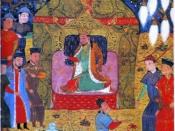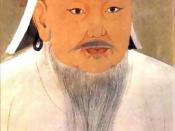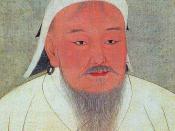The Mongols created a huge impact on the world today with their advanced fighting techniques and ability to expand an empire so quickly. This may seem insignificant, but it gave way to many different innovations such as the invention of paper money, the first democracy in China, and the first with paper.
In the book, the Mongols were portrayed in an objective view. Whereas with most of what the West thinks of the Mongols were portrayed from the view of an aristocrat who were all being annihilated for the purpose of subduing the general population.
The Mongols didnÃÂt have much of a stabilized industry because they were horsemen of the steppe region. Instead of creating their own industries, they used the ones of the regions and countries that they took over. The Mongols built roads and bridges for the support of trade.
The Mongols treated people fairly as long as they surrendered; otherwise they destroyed as a warning to other opposing towns and cities.
The Mongols didnÃÂt tax heavily, didnÃÂt discriminate, and they had an unprecedented religious tolerance. The Mongols also interfered very little with the local customs and culture.
The Mongols were said to have been one of the first to introduce paper, which was then copied by Europeans, and was used for the copying of manuscripts and documents. ÃÂKublai Khan built schools and revived the Chinese Hanlin Academy, in order to promote some types of traditional Chinese learning and culture.ÃÂ (204) They also introduced paper money.
Some of Kublai KhanÃÂs reforms included giving political strength to individual farms, which could have been an early form of democracy never seen before in China. The Mongol leaders were selected by council through elections. The women were inferior to the males, but many people turned to the females in their lives...


